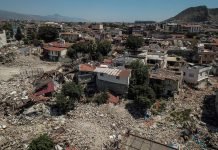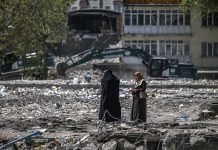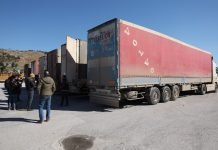
Earthquake survivors in southeastern Turkey face mounting problems as summer approaches and the need for proper accommodation has become crucial, the Independent Turkish service reported.
A magnitude 7.8 earthquake that struck near the Turkish city of Gaziantep— home to around 2 million people and on the border with Syria — as people were sleeping on Feb. 6 was followed by dozens of aftershocks, including a magnitude 7.5 temblor that jolted the region in the middle of search and rescue efforts the same day.
As temperatures are expected to rise to 40 degrees Celsius (104 degrees Fahrenheit), survivors living in tent cities will need things like air conditioners and refrigerators. However, many are not optimistic that the government will be able to meet their needs.
While access to water is still limited in the area, the increasing heat has raised concerns over maintaining hygiene. Flies, insects and mice have become serious problems in tent cities, and outbreaks of disease are expected.
One earthquake victim who is currently living in a container with his family said the closest communal bathrooms with running water were 45 kilometers from where they live. “We are given 18 liters of water every Tuesday and Thursday, but this is hardly enough,” he said. “What are we supposed to do with it? Shower? Use it in the toilet or the kitchen? They are handing out water at the Expo, but it’s 12 kilometers from here, and how are we supposed to go that distance every day?”
In the immediate aftermath of the earthquakes, a lot of clothes were donated, but these were winter clothes. As summer approaches, survivors urgently need summer clothes, shoes and underwear.
Victims said authorities did not seem concerned about these needs and that they were left to their own devices.
“Donations are just not enough,” said another victim. “Authorities help us with food, but we’re only given such things as rice, wheat and bread. Our children need fruit, vegetables and protein. The government needs to make it a priority to send these things to the earthquake zone.”
Many agreed that humanitarian aid was not distributed evenly and was mainly sent to organized tent cities. They urged the authorities to make sure assistance was also delivered to people who did not live in tent cities.
“We all need aid, not just people living in tent cities. Many victims have not been able to find a place in tent cities and live in a tent in their garden, or a container. Most of the time these people have difficulties accessing aid, and humanitarian actors skip them when delivering assistance,” said an earthquake victim in Hatay province.
The earthquakes, which according to a recent study by Chinese researchers were likely the most potent doublet ever to occur on land anywhere in the world, caused massive devastation across more than a dozen provinces in the country’s south and southeast as well as in parts of Syria.
The death toll has been increasing since Feb. 6 as new bodies are discovered during the removal of the rubble of flattened buildings.














